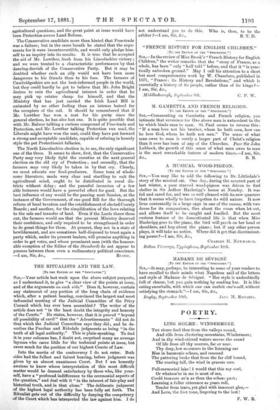THE RITUALISTS AND THE LAW.
[TO THE EDITOR OF THE " SPECTATOR.")
*Sfa,—Your article last week upon the above subject purports, as I understand it, to give "a clear view of the points at issue, and of the arguments on each side." Does it, however, contain any statement of any portion of the long chain of evidence which, after a patient hearing, convinced the largest and most inflaential meeting of the Judicial Committee of the Privy .Council which has ever been assembled? The writer of the article does not "in the least doubt the integrity and honesty of the Courts." He states, however, that it is proved "beyond all possibility of cavil" that the " Advertisements " did not do that which the Judicial Committee says they did; and he de- scribes the Purchas and Ridsdale judgments as being "in the teeth of all legal authority." This is plain-speaking. To find it in your columns has, I doubt not, surprised many an average layman who cares little for the technical points at issue, but cares much for the position of our highest Courts of Law.
Into the merits of the controversy I do not enter. Both sides had the fullest and fairest hearing, before judgment was given by an almost unanimous Court. But I am honestly anxious to know whose interpretation of this most difficult matter would be deemed satisfactory by those who, like your- self, have a "profound indifference to the ceremonial aspects of the question," and deal with it "in the interest of fair-play and historical truth, and in that alone." The deliberate judgment of the highest legal authority has been fully set forth. The Ritualist gets out of the difficulty by denying the competency of the Court which has interpreted the law against him. I do not understand you to do this. Who is, then, to be the






























 Previous page
Previous page